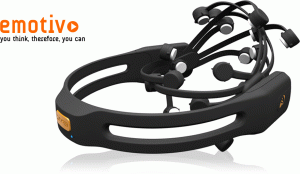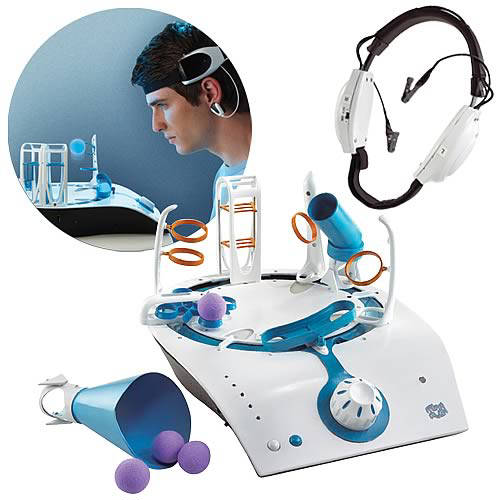Can You Use the Internet and Mobile Phones to Rewire Your Brain?
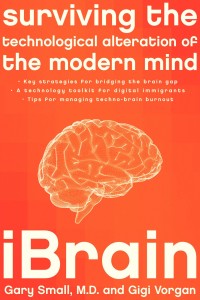 Email, search engines, social networking sites, text messaging, blogging, twitter, web-based phones, GPS, playing/making music/videos, taking and instantly sharing pictures and a slew of other technological capabilities have become widely available thanks to the internet, mobile phones and other hand-held gadgets. These new ways of creating, finding, sharing and using information are so powerful and pervasive that they are transforming how we learn, make-decisions, collaborate creatively and do many other brain-intense activities.
Email, search engines, social networking sites, text messaging, blogging, twitter, web-based phones, GPS, playing/making music/videos, taking and instantly sharing pictures and a slew of other technological capabilities have become widely available thanks to the internet, mobile phones and other hand-held gadgets. These new ways of creating, finding, sharing and using information are so powerful and pervasive that they are transforming how we learn, make-decisions, collaborate creatively and do many other brain-intense activities.
Some argue that they make us smarter or dumber. For example, the Atlantic Magazine article, Is Google Making Us Stupid? triggered a firestorm of discussion. Fortunately, the answer is no. Google and using search engines actually makes us smarter! Others take the point further and argue that the collective effect of all these technologies is driving a rewiring of our brains on a basic level. For a good introduction to this type of argument check out the book, Surviving the Technological Alteration of the Modern Mind.
The book’s theme is controversial but the authors do a great job outlining the specific technologies and their likely impact on boosting or dowsing cognitive performance. This is just the kind of information we will be covering in the Next Brain Blog. I will look at each claim and recommendation in later posts.
In the meantime, I am interested to hear reader stories on how the internet or mobile computing is being used to improve cognitive performance and build a better and longer-lasting brain.
Categories: Books, Decision Making, IQ and EQ, Memory and Learning, Perception, Software Tags: creativity
Using Neurofeedback to Train Your Mind
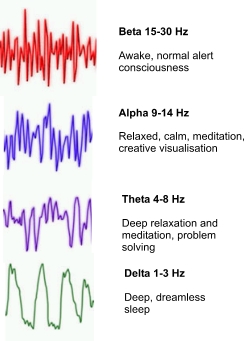 Neurofeedback training devices translate brainwaves into an external signal such sounds, graphs on a computer screen, movement of your computer’s cursor, action in a video game and even the motion of remote controlled toys. Being able to hear or see your brainwaves in this way provides essential feedback for learning how to control them to improve mental focus, modulate your mood and sharpen your thinking.
Neurofeedback training devices translate brainwaves into an external signal such sounds, graphs on a computer screen, movement of your computer’s cursor, action in a video game and even the motion of remote controlled toys. Being able to hear or see your brainwaves in this way provides essential feedback for learning how to control them to improve mental focus, modulate your mood and sharpen your thinking.
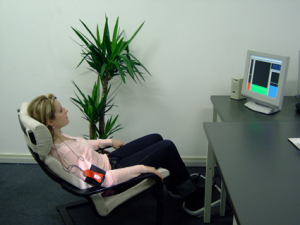 Neurofeedback has been proven to work in a clinical setting. You can go to a therapist and in about 10 weeks achieve some real results. A typical setup is shown to the left.
Neurofeedback has been proven to work in a clinical setting. You can go to a therapist and in about 10 weeks achieve some real results. A typical setup is shown to the left.
Devices for use by consumers at home are starting to hit the market. There are general purpose brain computer interfaces (BCI) such as the EPOC headset from Emotiv. It sells for $300 and comes with some basic games.
The only other consumer-level BCI I am aware of is being sold by Neurosky. It is cheaper ($199) but it comes with a single sensor versus the 14 for EPOC. The Neurosky technology is being used to develop mind-controlled toys. Check out Mattel’s Mindflex below.
It is not clear if the at-home neuofeedback devices are producing results or if they even work well. Consumer reviews tend to be mixed. For example, Mindflex Game has 58 customer reviews on Amazon:
- 5 star (14)
- 4 star (18)
- 3 star (8)
- 2 star (6)
- 1 star (12)
No matter, as the technology improves there can be little doubt that neurofeedback devices will become a powerful force for improving our cognitive performance. Brain computer interfaces, mind controlled toys and video games as well as other consumer-level neurofeedback devices will be covered frequently in the Next Brain Blog.
I am very interested to hear from readers that use neurofeedback in a clinical setting or at home. Please leave a comment and share your experiences.
Source: Image of Brainwaves and clinical use of Neurofeedback.
Categories: Executive Function, Mental Focus, Perception, Software, Training Tags: BCI, brain training, Brainwave Entrainment, games, neurofeeback
Grow Smarter While Having Fun
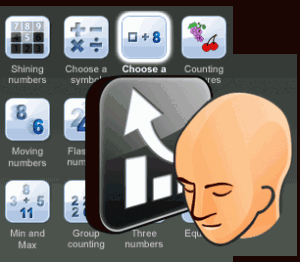 Brain games are all the rage. These are games you play for fun on your PC, game console or phone that also improve your cognitive functioning. There are dozens of traditional games and more recently scientifically-designed games that aim to improve memory, processing speed, visual perception, problem solving skill, mental focus and many other aspects of cognitive performance.
Brain games are all the rage. These are games you play for fun on your PC, game console or phone that also improve your cognitive functioning. There are dozens of traditional games and more recently scientifically-designed games that aim to improve memory, processing speed, visual perception, problem solving skill, mental focus and many other aspects of cognitive performance.
Do they work? Scientific American published an interesting article that took on that very question. What they found was many (50 or so) studies that show brain games can improve task performance but few if any that show that the effects translate into improvements in everyday cognitive activities. But they are optimistic:
One thing remains clear: there is no serious harm to brain training other than the effect on your wallet (and the risk of some egg on your face if your seven-year old can play them better). And evidence is accumulating that they not only improve the skills they are designed to help, but likely generalize to other cognitive abilities and have some long-lasting benefits.
Given this, games will be a frequent topic in the Next Brain Blog.
Another question to ask is are they fun? I’ve tried many of the scientifically designed brain games and find them boring after a couple of plays. Fortunately, some traditional games and puzzles also offer some cognitive performance boosts. For example, the popular math puzzle Sudoku is included in BrainAge, a brain training program pack with games that runs on a Nintendo DS handheld video game device.
The key is to find brain games that are truly fun for you and that have evidence supporting claims of cognitive improvement.
Here are some links to get your search started:
- Scientifically Designed Brain Games by Lumosity
- Top 50 Brain Teasers and Games by SharpBrains
- Top 10 Websites for Brain Training
Please post a comment on your favorite game that has brain boosting effects.
Source: Image of Resco Brain Games
Categories: Memory and Learning, Mental Focus, Perception, Problem Solving, Software Tags: brain training, games
Sharpen the Senses to Accelerate the Mind
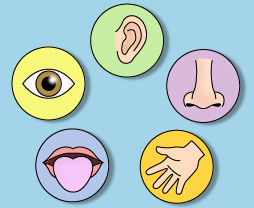 Being observant or attuned to the sounds, sights, smells, tastes and tactile feelings about you is a set of skills that can be learned. The more aware we are the richer our experiences and the more effective our brains and minds will be. Said another way, if we don’t hear, see, smell, taste or feel something it is hard to remember, think about, learn from or use it to solve a problem.
Being observant or attuned to the sounds, sights, smells, tastes and tactile feelings about you is a set of skills that can be learned. The more aware we are the richer our experiences and the more effective our brains and minds will be. Said another way, if we don’t hear, see, smell, taste or feel something it is hard to remember, think about, learn from or use it to solve a problem.
Small improvements in observational skills can lead to a big jump in cognitive performance.
Given this, developing skills to sharpen our senses will be a frequent topic on the Next Brain Blog.
But how do we go about improving our ability to perceive the world? There is no how-to manual. Fortunately, the art of perception is taught in many disciplines. For example, supercharging your skills of visual perception is taught in drawing and law enforcement classes. How to hear is taught in music appreciation. There are many lessons we can draw from these disciplines that will help us sharpen our senses in everyday settings.
Take for example the techniques for visual observation that are taught to security and law enforcement personnel. This blog post summarizes one such technique nicely:
“When you set out to develop your observation skills, there’s a simple exercise that you can do to help. When you encounter a person while in a public place, in the time that you are with that person, see what you can observe about him or her. Catalogue the person’s height, weight, build, hair color, eye color, clothing and any distinguishing marks as though you will have to describe the person to the police afterwards. Notice important and telling details like whether the person is wearing a wedding ring. Also notice the person’s body language, facial expressions and eye movements, see what hypothesis you can form about their emotional state. Be careful not to stare while you’re observing all of these things, you don’t want to come off as creepy. If you feel comfortable, engage the conversation and see which of your estimates were on the mark. Once you feel comfortable with this exercise, up the ante and see if you can observe 2, 3 or 4 people at once. As you go through these exercises, you’ll notice that your ability to observe will increase tremendously.”
You can do this yourself. If you try it or use a different technique for sharpening your senses leave a comment and share your experiences.
Source: Five Senses Image
Categories: Perception Tags:
Do You Have You Membership to a Brain Gym?
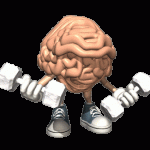 Over the last five years dozens of companies offering software to “train your brain” have sprung up. The software is often a structured time-based test or some form of a game. It can run on your PC , game console or even your smart phone. The idea is to give your brain a work out much like going to a gym. To see a brain working out click on the image to your right.
Over the last five years dozens of companies offering software to “train your brain” have sprung up. The software is often a structured time-based test or some form of a game. It can run on your PC , game console or even your smart phone. The idea is to give your brain a work out much like going to a gym. To see a brain working out click on the image to your right.
But what are they proven to do for your brain? Many claim to improve memory, visual perception, planning and help avoid cognitive decline as we age. Most have studies that show you will improve on the tasks in the software but what is less clear is if that transfers to doing similar cognitive tasks in other setting such as those in daily living or at work.
Brain or cognitive training software is rapidly advancing and will be a regular topic on this blog. There is little doubt that it is an important tool for building YourNextBrain!
![]() To give brain fitness software a try, click on this demo of the Personal Coach from CogniFit (you may need to scroll down the page and click the demo button). To get a better understanding of how CogniFit approach brain training works watch a 3-minute video of why it is effective.
To give brain fitness software a try, click on this demo of the Personal Coach from CogniFit (you may need to scroll down the page and click the demo button). To get a better understanding of how CogniFit approach brain training works watch a 3-minute video of why it is effective.
I am not endorsing the CogniFit product just offering it as an example. If you are interested in this type of technique for building YourNextBrain! comment on this post and I will reply with a list of leading vendors and products.
Looking forward to hearing about your experiences at the brain gym.
———————————————————————————————–
Source for image above of brain exercising can be found here.
Categories: Memory and Learning, Other, Perception, Problem Solving, Software, Training Tags: brain fitness, brain gym, brain training, cognitive fitness

